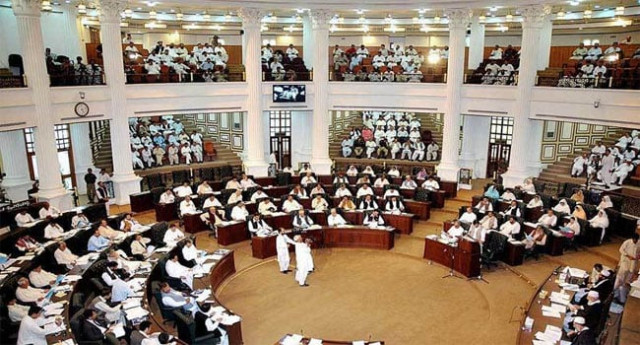New draft of Ehtesab Commission law comes as mixed blessing
The draft has fixed faults in the original act on filling important slots in the commission

PHOTO: INDUS ONLINE
The draft, which was tabled at K-P Assembly on Friday, has fixed faults in the original act on filling important slots in the commission. This includes the duration within which these slots ought to be filled. However, the draft presents ambiguities regarding the jurisdiction of the commission.
Assigning limits
The draft limits the commission to conducting enquiry or investigations in cases resulting in losses worth more than Rs50 million to the provincial exchequer.
Overhaul: Government plans to restructure ACE along modern lines
The draft has fixed the issue of the existence of the Anti-Corruption Establishment, a parallel accountability body in the province in the presence of the commission. It clarifies that cases involving losses below Rs50 million to the provincial exchequer shall be dealt with by the Anti-Corruption Establishment.
To achieve this, the draft bars the commission from conducting enquiries or investigation in cases resulting losses below Rs50 million to the provincial exchequer.
However, this raises a network of doubts over which department will define the magnitude of losses before an enquiry or investigation is conducted.
Limiting the DG’s powers
The draft also limits the powers of the director general (DG) of the commission, especially with respect to recruiting staff.
Before the amendments, the DG was allowed to make appointments for the six wings of Directorate General. The human resource wing followed the human resource policy, eligibility criteria and methods of appointment laid down by the commission. According to the new draft, the commission, and not the DG, will make the appointments. The DG would merely give recommendations in this regard.
BoK advertisement: K-P forms four-member inquiry panel
By amending Section 13 of the act, the draft eliminates the powers and functions of the DG regarding the appointment of advisers, consultants and experts for his own assistance.
Matters of appointment
Moreover, the new draft calls for the examinations of employees appointed before the new bill by scrutiny committee.
The draft sets a time period of 120 days during which the search and scrutiny committee would fill the DG’s post if it falls vacant. The committee will now be bound to complete the process with 120 days from the date the post falls vacant.
The age limit for the DG was not more than 65 years. However, the draft eliminates the age limitation, which is objectionable.
It authorises the Chief Ehtesab Commissioner to appoint or designate an officer to temporarily assume charge till a new DG is appointed if the post falls vacant. The original law was silent over this and the new draft offers clarity in this regard.
Clean chit
As per the draft, the commission will also not be allowed to take action in matters involving pure procedural lapses in ongoing schemes of the government. As a result, the incumbent government appears to have provided a clean chit to its ongoing development projects. This raises question over who will conduct enquiries if irregularities occur in these schemes.
Time periods
The draft also sets a time period of 30 days during which the commission can keep records of any government office, private firm or individual for enquiry or investigation.
Taking a stand: JI slams Bank of Khyber MD, demands enquiry
It also assigns the commission a time period of 60 days to complete the enquiry and subsequently provides 90 days for the investigation phase. The enquiry period can be converted into the investigation phase with the DG’s approval. However, this can only happen before the 60 days are completed and if sufficient evidence is collected.
The DG can extend both time limits on the request of the enquiry officer. This can only happen if the enquiry or the investigations cannot be completed within the defined period. The commission shall make its decision within seven days and shall file a reference in court within the same period of time.






1724319076-0/Untitled-design-(5)1724319076-0-208x130.webp)






COMMENTS
Comments are moderated and generally will be posted if they are on-topic and not abusive.
For more information, please see our Comments FAQ